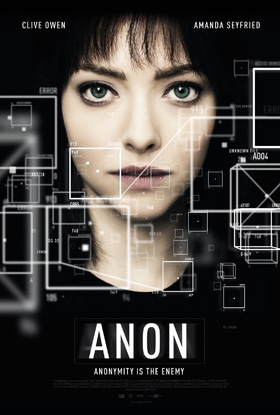


Sal Frieland (Clive Owen) strolls down a city street, the anonymous faces in the crowds streaming past him instantly tagged with pop-up IDs. Frieland's a cop in a future where every brain is connected to a central server, his hardwired Google Glass eyeballs giving him access not just to individuals' data but everything they've seen and heard, all of it recorded for posterity and occasionally self-incrimination. Then, he's called to a murder scene and finds the mind of the victim has been hacked––the culprit gone without leaving a digital footprint of any kind. Is this ghost in the machine a serial killer, an assassin, or something else?
Anon is blessed with great casting in Owen as a taciturn figure who never betrays his feelings behind a determined expressionless face and has his own moral code apart from the bureaucratic momentum of the force, a hint of loss and regret in his devotion to justice. Amanda Seyfried is the "ghost," a dark web hacker who makes a great living editing the timelines of clients with secrets they'd prefer to keep private. When those clients turn up dead, the film slips into cat-and-mouse mode, the day-after-tomorrow setting ostensibly allowing filmmaker Andrew Niccol (screenwriter of The Truman Show and writer/director of Gattaca) to broach ideas on the boundaries of privacy in the digital age. Pertinent it may be, but as a science fiction concept it's already dated. Niccol barely addresses the morality of the devil's bargain of trading privacy for convenience and protection, all the more frustrating considering the provocative themes and moral struggles of his previous film, 2014's drone pilot drama Good Kill.
There's a potentially grueling thriller inherent in Anon's premise. The murder victims view their own deaths through the eyes of their killer and Sal's mind itself becomes a target, his most personal memories deleted and his very reality hacked with an assault on his senses. It should be a nightmarish ordeal; yet, for a film steeped in subjectivity and techno-voyeurism, Anon retains a frustrating, video game-style distance from their experiences.
The result plays like an episode of Black Mirror shorn of the brutal consequences, or Philip K. Dick without the edge of madness. Niccol's future falls back on familiar tech-noir tropes: the chalky look of overcast days and steely-blue urban nights lit by sodium vapor lights; the generic city stripped of the urban crush of overpopulation or any suggestion of poverty on the margins; austere settings of isolated characters plugged into a shared reality but physically and emotionally disconnected. He trips over simple narrative sleight of hand that even the most routine mysteries easily manage, withholding key information so clumsily that he telegraphs his twists and fails to muster any real sense of suspense or terror.
Anon means "soon," and perhaps there's a version of this film that would earn that title. Niccol's effort, alas, warrants the alternate definition: anonymous.
Sean Axmaker lives in Seattle with his cats, Hammett and Chandler, and writes the syndicated newspaper column Stream On Demand and the companion website.